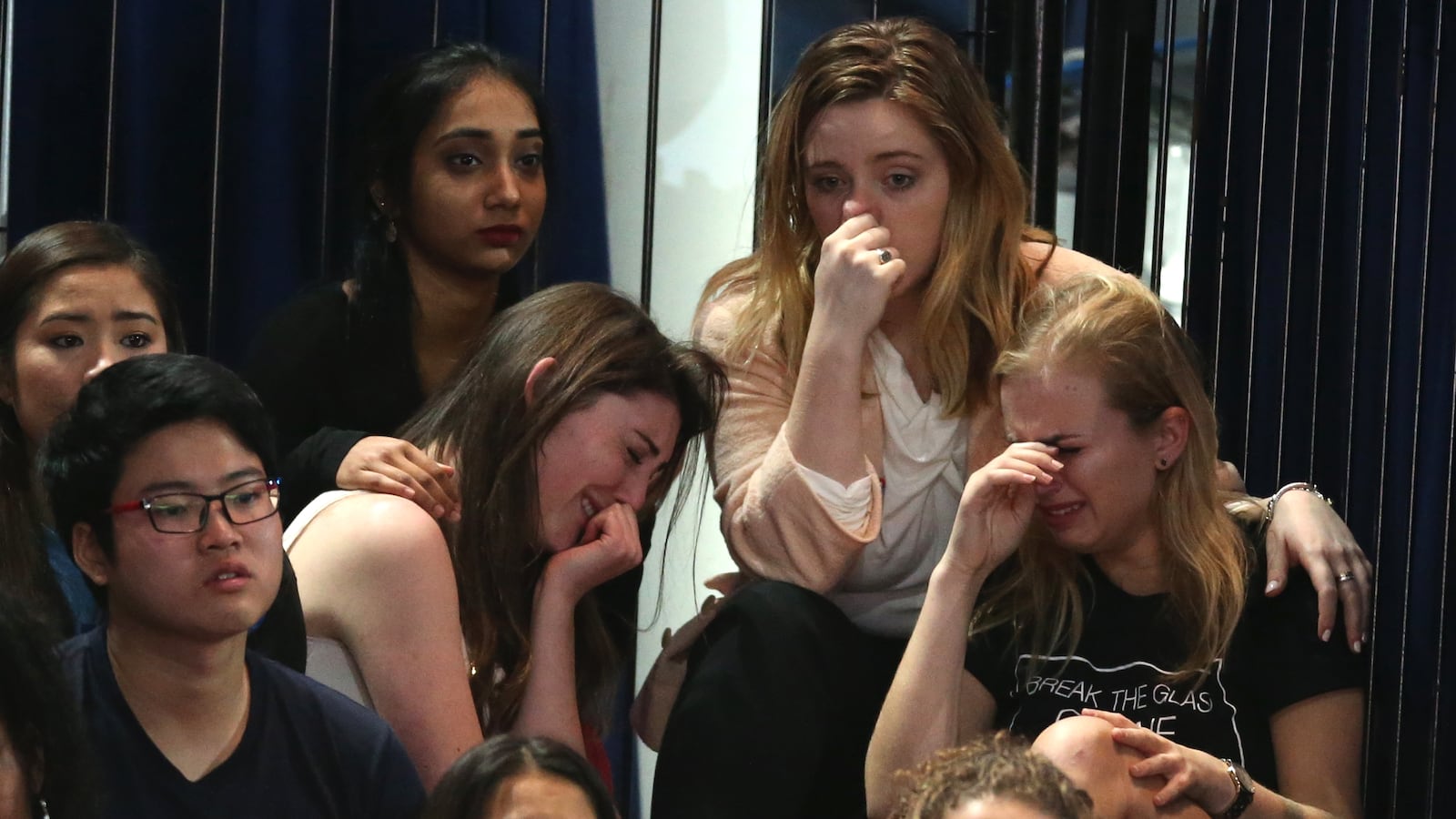Crying can be therapeutic, healing, a way to connect. It can convey to another party that they are hurting you and should stop, or as a signal to other concerned parties that the crier is in a place of emotional vulnerability and could use support. But here’s what crying doesn’t do: change a goddamn thing about what happened on Nov. 8. Nor does crying stop the advance of the new American trajectory. Death, time, and Donald Trump’s transition team are numb to human emotional needs.
Late on Nov. 8, the news was a slideshow of faces one might expect to see in the aftermath of tragedy, not a democratic election. Hands laid lightly over mouths, eyes wide, heads leaned over adjoining shoulders, tears both open and concealed. It’s probably safe to say that nobody at Hillary Clinton’s would-be victory party at Manhattan’s Javits Center expected what was about to happen when the world opened up beneath them, and that if they’d known, they would not have shown up to be photographed and had their sadness enshrined in perpetuity.
Millennials are by no means a coddled generation; their life’s work will be, basically, to unfuck the world in all of the ways that their parents’ and grandparents’ generations fucked it. But they’re the Harry Potter generation, a generation that has been told that there’s virtue in being true to oneself, and that after the threat of darkness, light wins. They strive for authenticity, they value authenticity in others. They are sensitive. They care.
As such, the crying seemed especially pronounced among the young. For many millennials who voted overwhelmingly for Clinton, this was the first loss of their politically aware lives. They’d only dealt with adult concerns during Barack Obama and Joe Biden’s administration, they’d only had Michelle, Malia, Sasha, Bo, and Sunny decorating the White House lawn. The cultural issues that had been important to them as a demographic had won out, for the most part—LGBT rights, mainstream embrace of the sort of feminism that makes everybody feel good about themselves all the time, the push toward marijuana legalization, multiculturalism and wokeness as a barometer for high-quality art. They’ve been able to customize their virtual neighborhoods, surrounding themselves only with other people whose views and sensibilities are represented in the mainstream progressive media. Being forced to confront millions of people who deviate drastically from everything they believe is good is likely to be a shock to their systems.
The crying continued throughout the week. On the subway in New York City, sniffles punctuated heavy silence. Sickness or sadness? It was impossible to tell without staring. Friends confessed to each other they’d cried dozens of times. Foreigners living and working legally in America cried privately, cried together. The sadness came in waves. People said it felt like a death, like a breakup, like a national disaster. People checked in on each other. “Are you OK?” they’d ask, as though a relative had passed.
Harrowing tales of crying continued into Friday, as Lena Dunham published an essay in Lenny Letter about how she was so distraught on election night, she broke into a hive that matched the hive of another woman in attendance at the Hillary Clinton rally, and how she cried for days after the election. The crying continued into the weekend. Saturday Night Live’s cold open ended with Kate MacKinnon, in character as Hillary Clinton tickling out Leonard Cohen’s “Hallelujah” on a piano, teary-eyed as she promised to fight on.
The forces that elected Trump do not care about Clinton supporters crying for days. In fact, I’d venture a guess that they’d love for nothing more than to hear that Hillary Clinton’s defeat caused Lena Dunham to weep and develop a hive, or to learn that the trains in New York City were full of shell-shocked liberals who could not believe that this country’s culturally-decelerated middle actually imposed its will on them. Call it the You Think You’re Better Than Me?! Vote.
Dislike of Hillary Clinton was a motivator for many Trump voters; it’s not a stretch to imagine that they wish the same sadness and failure on her supporters. Trump’s was a campaign that enjoyed the support of a troll army that barraged Trump critics with hate on social media, that hired as its CEO the head of Breitbart (which, full disclosure, once published a piece wherein it implied that I deserved it that time I was randomly assaulted in Brooklyn). Crying is exactly what a troll candidate and his trollalikes would prefer his opponents do when defeated. Mercy isn’t exactly their forte. At a certain point, talking or writing about how much you’ve been crying doesn’t do anything but make them happy.
In the time a plurality of the nation has spent crying, President-elect Donald Trump has not taken a moment to recognize the waterworks. He’s been completely unresponsive to millions of tweets about crying when he floated the idea of Steve Bannon filling a senior-level position at the White House, or when he appointed a climate-change denier to head up the EPA transition. He flippantly dismissed the notion of Roe v. Wade being repealed, suggesting that women in states without legal abortion simply skip on over to a state where it’s legal. He doesn’t have to care about what the side that lost the election thinks about him in the same way that the hunter who catches a mink in a trap isn’t normally swayed by the animal’s cries of pain.
Crying and swapping stories about crying, as cathartic as it can feel, ultimately serves little purpose. It won’t undo what’s been done. And it won’t garner sympathy from the opposition. If anything, it gives them more strength. If it’s not going to alter the behavior of those who are causing you offense, then it’s nothing more than performance for the people with whom you agree.






